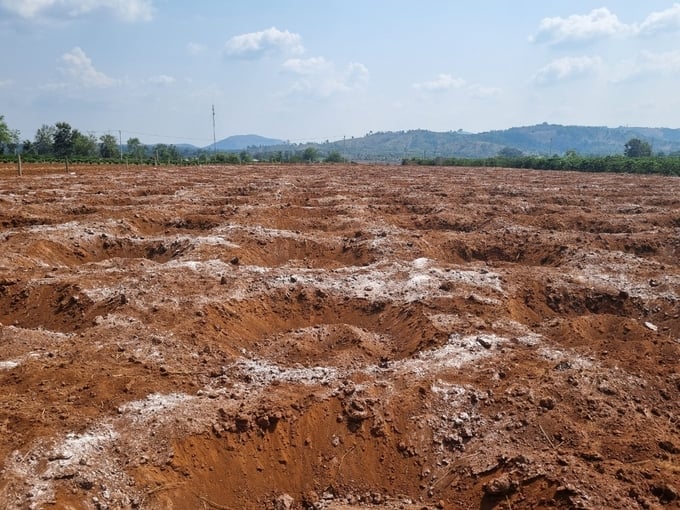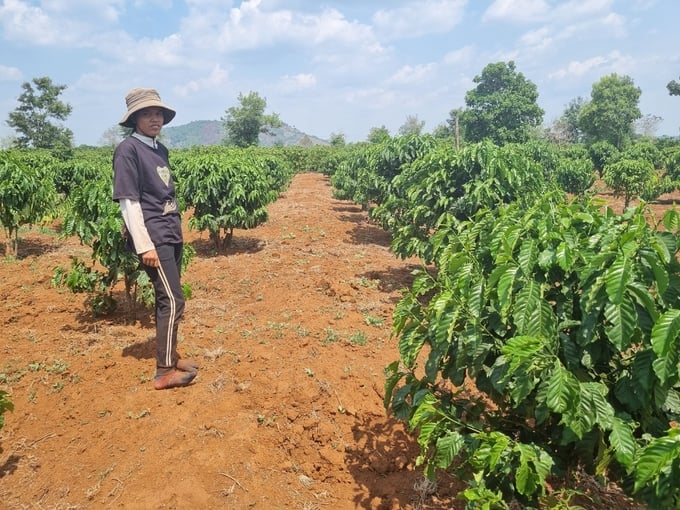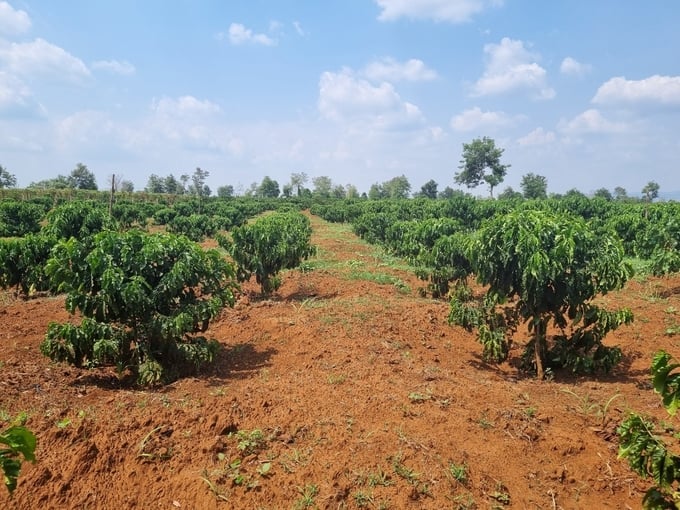November 28, 2025 | 04:20 GMT +7
November 28, 2025 | 04:20 GMT +7
Hotline: 0913.378.918
November 28, 2025 | 04:20 GMT +7
Hotline: 0913.378.918

Many gardens have been dug and fertilized in preparation for planting coffee. Photo: Tuan Anh.
Gia Lai currently has over 100,600 ha of coffee, with 90,000 ha in the production stage. The average yield is about 31 tons/ha, with a total production of over 281,000 tons. Despite signs of a decrease, coffee prices are still above VND 100,000/kg. Due to record-high coffee prices, three to four times higher than in previous years, farmers everywhere are rushing to plant.
These days, touring around Ia Grai district (Gia Lai province), it's easy to spot people busy preparing land and digging holes to plant coffee. Alongside replanting to replace old coffee gardens, many new areas are being completely converted to coffee cultivation. In fact, many other crops have been cleared to make way for coffee.
Just over a month ago, the over one-ha garden of Mr Tran Van Linh's family (Ia Ba commune, Ia Grai district) was covered in passion fruit vines, but now it has been cleared to prepare for planting coffee. Like many other households, Mr Linh's family has dug holes, applied fertilizer, and is now just waiting for the rain to start planting.
Mr Linh explained that in previous years when passion fruit prices soared, his family also followed suit to plant. But then, after a short time, passion fruit prices plummeted, causing significant losses as the selling price couldn't cover the labour costs of harvesting.
Seeing the recent sharp rise in coffee prices, Mr Linh's family boldly planted over 1,000 coffee trees, hoping that in the next few years, coffee prices will remain stable as they are now.
"Coffee remains the main, sustainable crop of Gia Lai province, so despite price fluctuations, our family is determined to plant it. Compared to other crops, coffee is relatively easy to grow and maintain, and it is less susceptible to pest attacks. We hope that in a few years when the coffee is ready for harvest, the price will still be high", Mr Linh shared.

The Pyul family (village A, Ia Mo Nong commune, Chu Pah district) is taking advantage of the opportunity to renovate their land, dig holes, and wait for the rain to plant coffee. Photo: Tuan Anh.
Heading to Chu Pah district, many households have devised plans for replanting or planting anew after witnessing the recent surge in coffee prices. All preparations, from land renovation, and hole digging, to fertilization, have been carried out by the people, awaiting the rain in about a month to proceed with planting.
While diligently applying fertilizer to each hole in preparation for planting coffee, Mr Pyul (village A, Ia Mo Nong commune, Chu Pah district) stated that his family previously had nearly 1 ha planted with rubber trees. However, due to the difficulties in rubber latex extraction and unstable prices, combined with the high investment cost, the family decided to uproot the rubber trees and switch to planting coffee.
"We have realized that coffee is still a more sustainable crop compared to many others. Especially, the investment cost for planting coffee is not high, and it is easier to care for. Currently, with coffee prices soaring, we hope that in the next few years, this price level will remain stable", Mr Pyul said.
In recent years, people in Gia Lai province have often followed market trends in their production. At one time, the booming passion fruit planting movement somewhat disrupted crop planning. The consequence was a price collapse, leading farmers to uproot their orchards.
With its land and climate potential, Gia Lai province is very suitable for coffee cultivation. However, for coffee to develop sustainably and not be subject to market fluctuations, it needs to be planted with a clear plan, in suitable areas, and with ensured irrigation water sources.

Coffee replanting is the prioritized policy that Gia Lai province will focus on implementing in the near future. Photo: Tuan Anh.
Mr Phan Dinh Tham, Head of the Department of Agriculture and Rural Development in the Ia Grai district, stated that the coffee area in the district remains stable at about 18,000 ha. According to the plan, in 2024, Ia Grai district will replant approximately 450 - 500 ha of coffee. However, with the current high coffee prices, the planned replanting area is expected to be higher than initially projected.
"The district will strive to maintain the coffee area at around 18,000 ha. For old and low-yield coffee areas, replanting is encouraged. However, replanting should not be done all at once but should be staggered to ensure a steady income. Furthermore, the district also advises people that when replanting or planting new coffee, they should actively consider irrigation water sources to avoid drought conditions like those currently experienced", Mr Tham advised.
Dak Doa district has the largest coffee-growing area in Gia Lai province, with about 28,000 ha. Mr Nguyen Kim Anh, Head of the Department of Agriculture and Rural Development in Dak Đoa district, said that according to the annual plan, the district will replant about 300 ha of old and ineffective coffee. To replant effectively, the district does not encourage planting in areas where irrigation water sources are not guaranteed.
"In reality, people are rushing to plant coffee seeds, but the district does not encourage new planting. Instead, it should focus on replanting, stabilizing the area, increasing productivity, improving product quality, and developing sustainably, in line with clean agriculture principles", Mr Anh shared.

Gia Lai advises people to stabilize the land area and focus on sustainable coffee production. Photo: Tuan Anh.
Translated by Hoang Duy
/2025/11/27/3830-1-152901_403.jpg)
(VAN) Dong Nai is developing its key crop areas, expanding planting area codes, and applying high technology to increase the value of agricultural products, aiming at a green and sustainable agriculture.

(VAN) Tay Ninh’s livestock sector is undergoing a major transformation, applying high-tech, closed-loop circular models to build sustainable value chains.
/2025/11/26/3627-4-082628_818.jpg)
(VAN) From a small café on the red basalt highlands, Le Van Hoang started a business with clean coffee, building Enjoi Coffee into a symbol of organic agriculture in the Lam Dong plateau.
/2025/11/25/0045-1-135246_13.jpg)
(VAN) Ca Mau is researching a model of sea-encroaching embankments combined with viaducts and logistics service zones, aiming both to prevent erosion and create land funds for marine economic development.

(VAN) The information was shared at the seminar 'Urban Agriculture - Solutions for Developing Green Spaces,' organized by the Kinh te & Do thi Newspaper and the Biotechnology Center of Ho Chi Minh City.
/2025/11/19/4141-2-132831_216.jpg)
(VAN) One of Japfa's outstanding solutions is implementing digital transformation and artificial intelligence (AI) to optimize operations, enhance productivity, and advance sustainable development.
/2025/11/19/4847-1-093540_448.jpg)
(VAN) The Gia Lai Provincial People’s Committee had a working session with the delegation of the U.S. Department of Agriculture, the State of Idaho, and representatives of the State's leading enterprises.